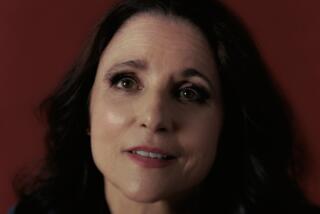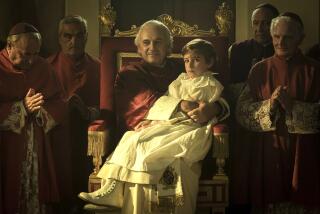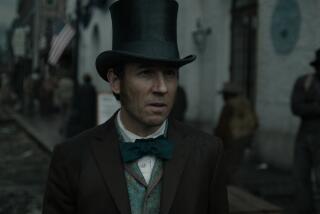TV Reviews : Dreyfus Affair Dramatized in HBO’s ‘Prisoner’
- Share via
“Prisoner of Honor” is one of those movies that looks promising on paper--good cast, interesting director, intriguing story about morality, bigotry and politics--but ends up being considerably slimmer than its topic.
It premieres on HBO at 9 tonight, retelling the infamous Dreyfus Affair from the perspective of an aristocratic French colonel who nearly ruined his own military career by crusading for the release of a fellow officer wrongly accused and convicted of treason and espionage in the mid-1890s.
Its surface story--of wronged soldiers being sacrificed by arrogant, self-serving superiors for a perceived greater good--echoes “Paths of Glory’ and, to a lesser extent, “Breaker Morant.” What distinctively colors this real-life case, though, is anti-Semitism, for the pivotal victim, Capt. Alfred Dreyfus, is a Jew. He remains confined on Devil’s Island even after the army learns from counterintelligence head Lt. Col Picquart (Richard Dreyfuss) that the real spy is someone else. Better an innocent Jew remain in prison than the army itself be scandalized and embarrassed.
Although regally staged, “Prisoner of Honor” is otherwise little more than a moderately arresting treatment of a subject designed by history to be truly captivating. All the ingredients are here. Jose Ferrer tried assembling them from the perspective of Capt. Dreyfus in the modestly distinguished “I Accuse!,” a 1958 film that he directed and starred in.
Now comes Dreyfuss (not to be confused with the Frenchman Dreyfus), who also not only stars in “Prisoner of Honor,” but co-produced it with Judith James and took over the direction from Ken Russell after the latter was let go, reportedly for creative reasons. Russell’s name still appears in the credits.
Dreyfuss was understandably attracted to Picquart, a man with such a rigid sense of honor that he risked personal disaster by campaigning for a Jew despite his own anti-Semitism. Unfortunately, that rigidity also stiffens Dreyfuss’ performance.
Meanwhile, Ron Hutchinson’s script takes us through a series of polarizing trials that strip back the army cover-up but--despite supporting work from the likes of Oliver Reed, Peter Firth, Jeremy Kemp and Brian Blessed--never sustain much dramatic intensity or truly capture this turbulent moment in history.
More to Read
The complete guide to home viewing
Get Screen Gab for everything about the TV shows and streaming movies everyone’s talking about.
You may occasionally receive promotional content from the Los Angeles Times.






